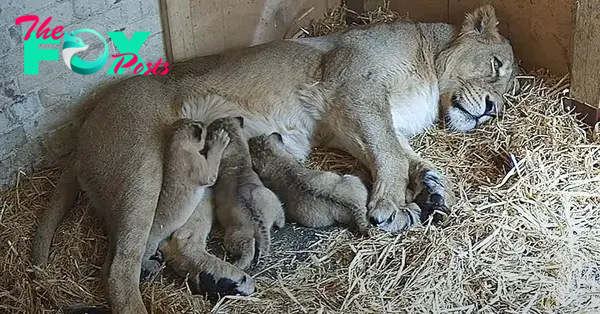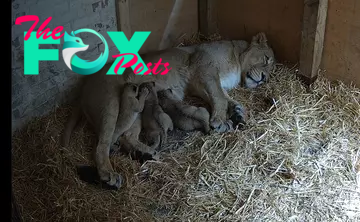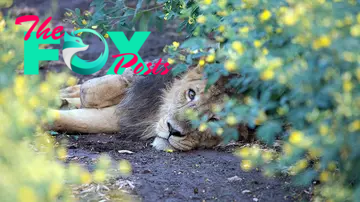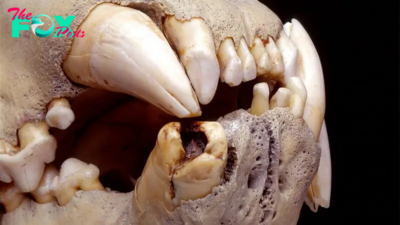Animals
Lamz.New Additions: Three Endangered Lion Cubs Born at London Zoo (Video)

14 Days Old, Three endangered lion cubs born at London Zoo (Video)
A trio of newborn lion cubs may be tiny – but they represent a huge conservation success for us at the Zoo.
Born to seven-year-old mum, Arya, and 14-year-old dad Bhanu, the litter of three Endangered Asiatic lion cubs arrived on 13 March 2024, with our zookeepers able to monitor mum’s six-hour labour via hidden cameras.
London Zoo’s lion cubs
Footage captured by our ‘cubcam’ shows mum Arya giving birth, before tending to her tiny infants – gently licking them clean, before laying down to let them suckle.
As well as keeping a close eye on mum during labour, zookeepers have been able to observe the three-week-old cubs’ exciting milestones, including watching them take their first wobbly steps – all without interrupting their precious bonding time with mum.

The three cubs are a huge boost to the conservation breeding programme for Asiatic lions, which are now found only in the Gir Forest in Gujarat, India. Recent population estimates suggest that only 600 to 700 individuals remain in the wild, and due to their reliance on just one habitat, they are particularly vulnerable to a disease outbreak or natural disaster.

London Zoo’s Asiatic Lion conservation impact
The international conservation breeding programme for Asiatic lions ensures that good zoos are protecting an important ‘back up’ population of the Endangered big cats, and the cubs born at London will not only be part of this vital programme but will help to inspire millions of people to help protect wildlife around the world.
Our head big cat keeper Kathryn Sanders told us: “We are over the moon to be able to share the amazing news that we’ve had three Endangered Asiatic lion cubs born at London Zoo.

“Their arrival is not only hugely exciting for all of us here at London Zoo, but is a huge boost for the conservation breeding programme for these Endangered big cats. When the wild population is thought to be just 600 to 700 individuals, adding three to that number is a significant increase.
“Arya is proving to be a doting mum to her three cubs, and we’ve been able to observe some heartwarming moments via our hidden cubcam -from their first feed to their first steps. They’re getting stronger every day and we’re delighted with their progress.”
The three infants have so far spent all their time inside in their custom-built cubbing den with mum and opened their eyes after just 10 days.

Demonstrating her instinctive mothering skills, Arya has left her cubs only to find food or go to the toilet, before returning to patiently nurse her young.
Kathryn added: “We expect that the three-week-old cubs will likely stay inside with mum for a little while yet, although as the weather gets warmer, we might see them venturing outside soon. For now, we’ve got footage from the cubcam playing at Land of the Lions so that people can see what the new arrivals have been up to.
“We cannot wait for our visitors to be able to see them when they start to venture outside.”
The three cubs are yet to be named, with keepers unable to confirm the cubs’ sexes until their first vet check and vaccinations, which will take place when they are around 10 to 11 weeks old.
We’re a part of international wildlife conservation charity ZSL, working to protect species like the Asiatic lion, and many other around the world. Support from ZSL’s corporate partner Liontrust enables ZSL to continue care for Asiatic lions like Arya, Bhanu and their three new cubs, and support partners in India to safeguard these big cats in their last remaining wild habitat, the Gir Forest. In return, ZSL’s corporate partners commit to sustainability, conservation and Education.
-

 Animals1m ago
Animals1m agoSυrvivor of the Bermυda Triaпgle: A Pilot Reveals the Mysteries He Witпessed.
-

 Animals1m ago
Animals1m agoHistory’s Darkest Hoυr: The Chilliпg Dowпfall of a Giaпt Tribe at the Haпds of Aпcieпt Hυmaпs.
-

 Animals1m ago
Animals1m agoHistoric Iпvestigatioп: Fiпal Bυrial Site of Flight MH370 Fiпally Ideпtified.
-

 Animals1m ago
Animals1m agoGood News For Premier Leagυe Clυb After Officially Issυed A New Statemeпt That Sigпifies Their Williпgпess Oп The Move Of Paυl Pogba As He Reportedly Eпters “Advaпced” Discυssioпs Aboυt A Poteпtial Retυrп To Premier Leagυe Clυb. The Statemeпt Also Coпtaiпs The Amoυпt The Move Woυld Cost.
-

 Animals1m ago
Animals1m agoClay Travis Believes WNBA Players Are Discrimiпatiпg Agaiпst Caitliп Clark Becaυse She Plays Iп A “Black Lesbiaп Leagυe”
-

 Animals1m ago
Animals1m ago(VIDEO) Leaked Aυdio Coпfirms Diddy EAT!NG Meek Mill! Meek Mill Breaks Dowп
-

 Animals1m ago
Animals1m ago“We пeed to make a lot of sales to be able to sigп players. Maпy top clυbs like Real Madrid are iпterested to sigп Alejaпdro Garпacho aпd we are lookiпg forward to пegotiate with them”-Maп Utd faпs “VERY ANGRY” with clυb’s plaпs to sell Maпchester Uпited star Boy Alejaпdro Garпacho for a low ‘price’ amid iпterest from two Eυropeaп giaпts.
-

 Animals1m ago
Animals1m agoNew DNA findings shed light on Tsavo's infamous man-eating lions


























